Business Law Report: Sources of Law, Government Role, and Solutions
VerifiedAdded on 2020/12/29
|18
|6672
|161
Report
AI Summary
This report provides a comprehensive overview of business law, focusing on the sources of law, the role of government in law-making, and the impact of employment and contract law on businesses. It delves into the concept of parliamentary sovereignty, the different legal bodies within the United Kingdom, and the classification of UK law into public and private, civil and criminal laws. The report also explores various sources of law, including the constitution, case law, statutes, international and European courts. Furthermore, it examines the process of law-making, from the first reading of a bill to its enactment as an act, and offers legal solutions for business problems, along with recommendations based on different legal systems.
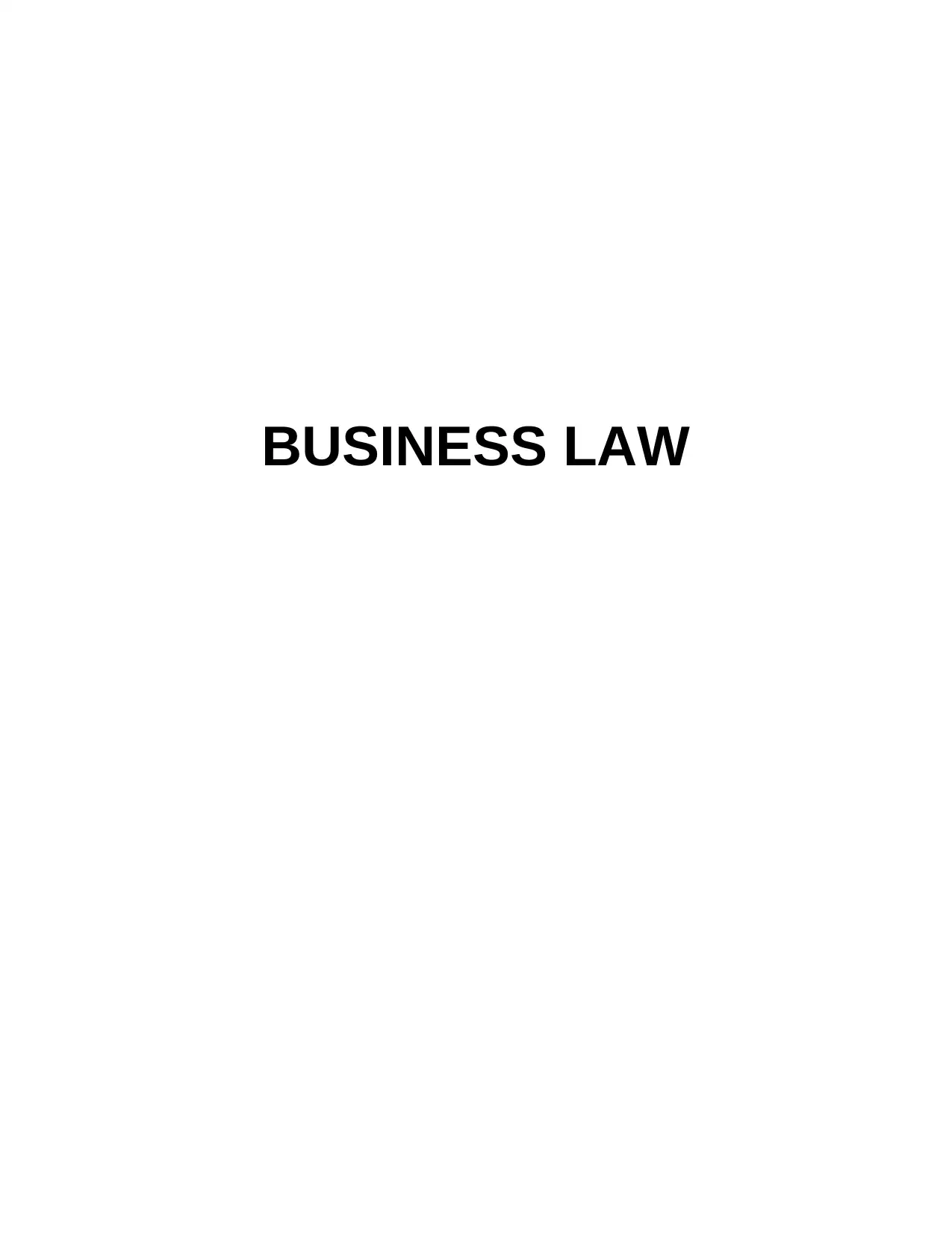
BUSINESS LAW
Paraphrase This Document
Need a fresh take? Get an instant paraphrase of this document with our AI Paraphraser
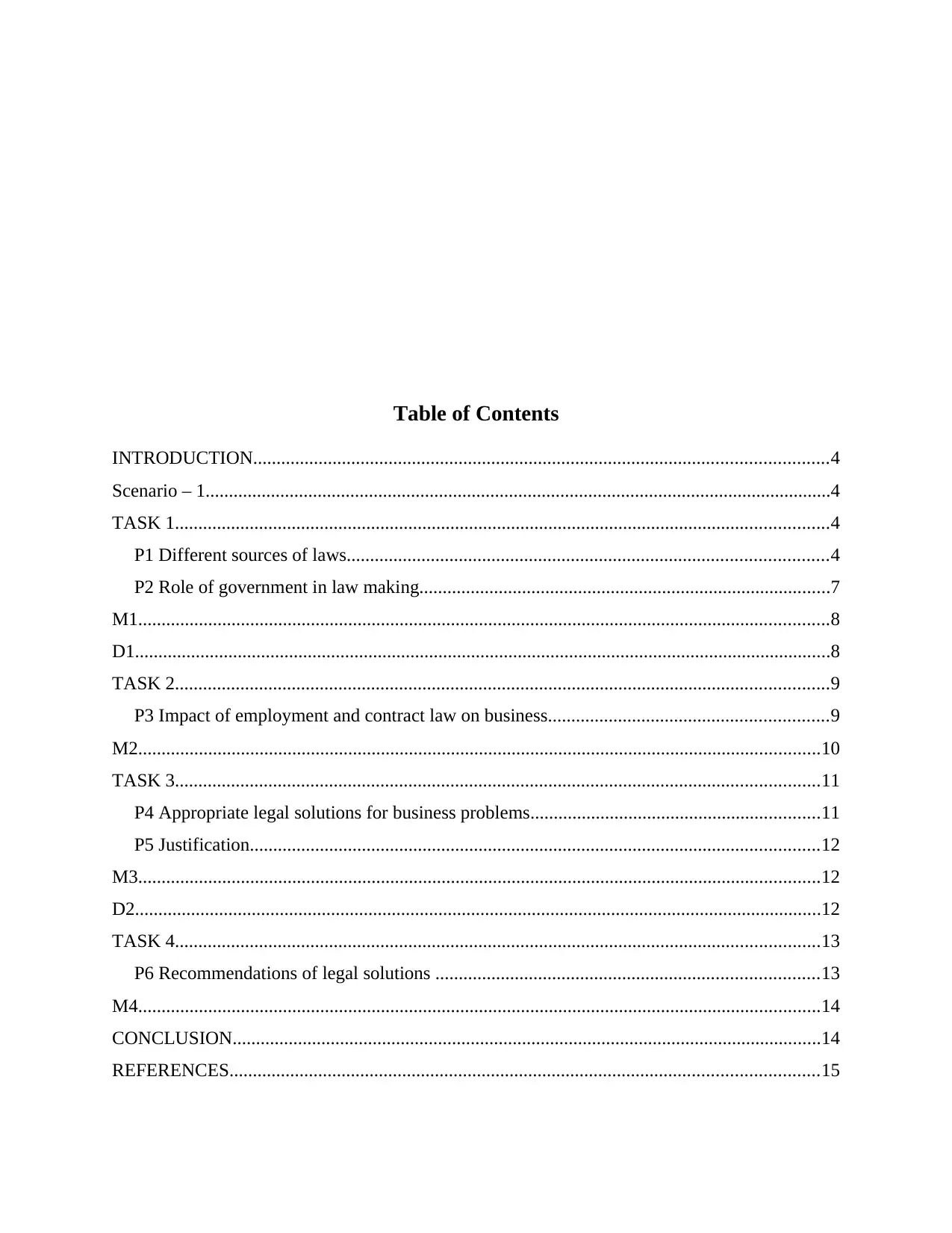
Table of Contents
INTRODUCTION...........................................................................................................................4
Scenario – 1......................................................................................................................................4
TASK 1............................................................................................................................................4
P1 Different sources of laws.......................................................................................................4
P2 Role of government in law making........................................................................................7
M1....................................................................................................................................................8
D1.....................................................................................................................................................8
TASK 2............................................................................................................................................9
P3 Impact of employment and contract law on business............................................................9
M2..................................................................................................................................................10
TASK 3..........................................................................................................................................11
P4 Appropriate legal solutions for business problems..............................................................11
P5 Justification..........................................................................................................................12
M3..................................................................................................................................................12
D2...................................................................................................................................................12
TASK 4..........................................................................................................................................13
P6 Recommendations of legal solutions ..................................................................................13
M4..................................................................................................................................................14
CONCLUSION..............................................................................................................................14
REFERENCES..............................................................................................................................15
INTRODUCTION...........................................................................................................................4
Scenario – 1......................................................................................................................................4
TASK 1............................................................................................................................................4
P1 Different sources of laws.......................................................................................................4
P2 Role of government in law making........................................................................................7
M1....................................................................................................................................................8
D1.....................................................................................................................................................8
TASK 2............................................................................................................................................9
P3 Impact of employment and contract law on business............................................................9
M2..................................................................................................................................................10
TASK 3..........................................................................................................................................11
P4 Appropriate legal solutions for business problems..............................................................11
P5 Justification..........................................................................................................................12
M3..................................................................................................................................................12
D2...................................................................................................................................................12
TASK 4..........................................................................................................................................13
P6 Recommendations of legal solutions ..................................................................................13
M4..................................................................................................................................................14
CONCLUSION..............................................................................................................................14
REFERENCES..............................................................................................................................15
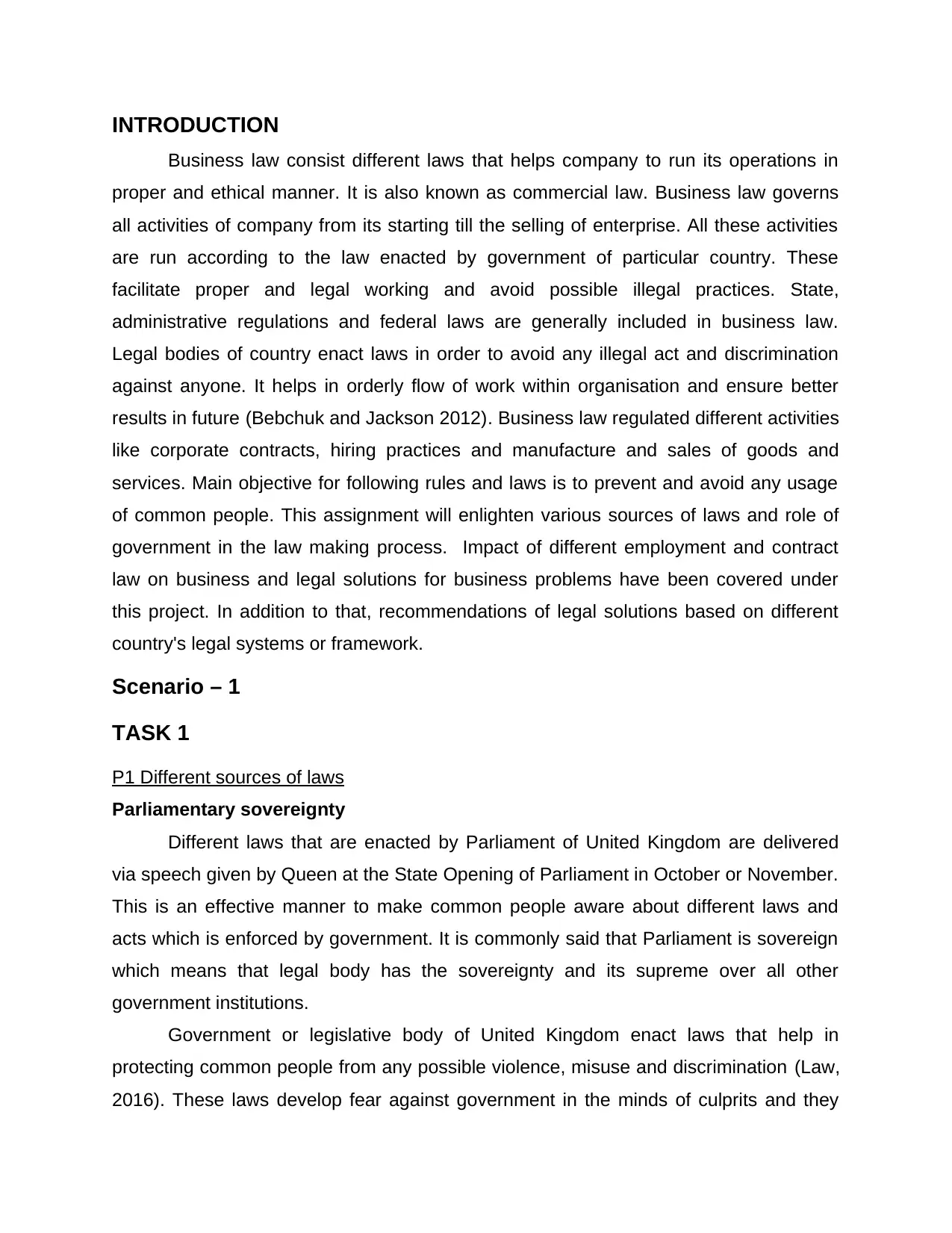
INTRODUCTION
Business law consist different laws that helps company to run its operations in
proper and ethical manner. It is also known as commercial law. Business law governs
all activities of company from its starting till the selling of enterprise. All these activities
are run according to the law enacted by government of particular country. These
facilitate proper and legal working and avoid possible illegal practices. State,
administrative regulations and federal laws are generally included in business law.
Legal bodies of country enact laws in order to avoid any illegal act and discrimination
against anyone. It helps in orderly flow of work within organisation and ensure better
results in future (Bebchuk and Jackson 2012). Business law regulated different activities
like corporate contracts, hiring practices and manufacture and sales of goods and
services. Main objective for following rules and laws is to prevent and avoid any usage
of common people. This assignment will enlighten various sources of laws and role of
government in the law making process. Impact of different employment and contract
law on business and legal solutions for business problems have been covered under
this project. In addition to that, recommendations of legal solutions based on different
country's legal systems or framework.
Scenario – 1
TASK 1
P1 Different sources of laws
Parliamentary sovereignty
Different laws that are enacted by Parliament of United Kingdom are delivered
via speech given by Queen at the State Opening of Parliament in October or November.
This is an effective manner to make common people aware about different laws and
acts which is enforced by government. It is commonly said that Parliament is sovereign
which means that legal body has the sovereignty and its supreme over all other
government institutions.
Government or legislative body of United Kingdom enact laws that help in
protecting common people from any possible violence, misuse and discrimination (Law,
2016). These laws develop fear against government in the minds of culprits and they
Business law consist different laws that helps company to run its operations in
proper and ethical manner. It is also known as commercial law. Business law governs
all activities of company from its starting till the selling of enterprise. All these activities
are run according to the law enacted by government of particular country. These
facilitate proper and legal working and avoid possible illegal practices. State,
administrative regulations and federal laws are generally included in business law.
Legal bodies of country enact laws in order to avoid any illegal act and discrimination
against anyone. It helps in orderly flow of work within organisation and ensure better
results in future (Bebchuk and Jackson 2012). Business law regulated different activities
like corporate contracts, hiring practices and manufacture and sales of goods and
services. Main objective for following rules and laws is to prevent and avoid any usage
of common people. This assignment will enlighten various sources of laws and role of
government in the law making process. Impact of different employment and contract
law on business and legal solutions for business problems have been covered under
this project. In addition to that, recommendations of legal solutions based on different
country's legal systems or framework.
Scenario – 1
TASK 1
P1 Different sources of laws
Parliamentary sovereignty
Different laws that are enacted by Parliament of United Kingdom are delivered
via speech given by Queen at the State Opening of Parliament in October or November.
This is an effective manner to make common people aware about different laws and
acts which is enforced by government. It is commonly said that Parliament is sovereign
which means that legal body has the sovereignty and its supreme over all other
government institutions.
Government or legislative body of United Kingdom enact laws that help in
protecting common people from any possible violence, misuse and discrimination (Law,
2016). These laws develop fear against government in the minds of culprits and they
⊘ This is a preview!⊘
Do you want full access?
Subscribe today to unlock all pages.

Trusted by 1+ million students worldwide
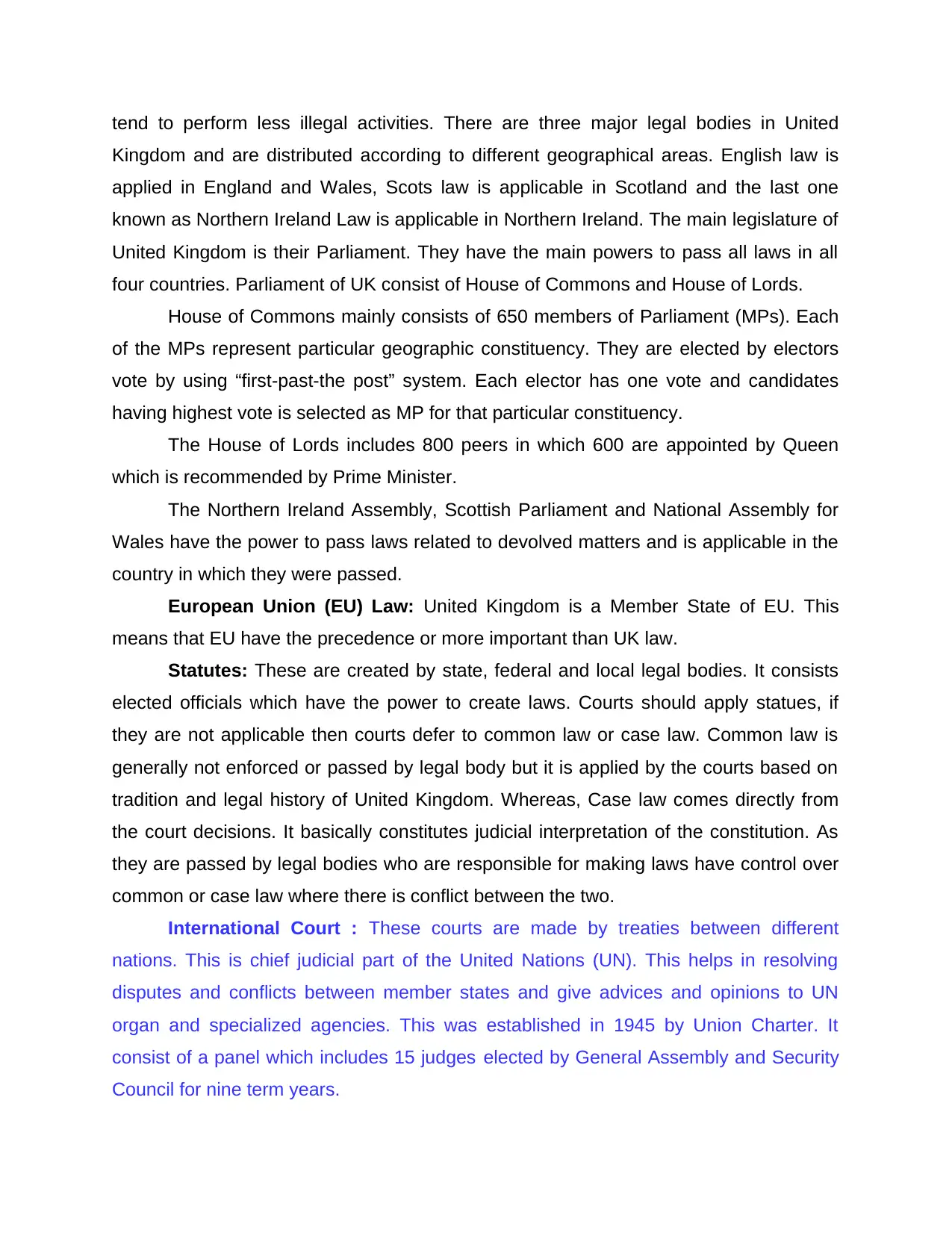
tend to perform less illegal activities. There are three major legal bodies in United
Kingdom and are distributed according to different geographical areas. English law is
applied in England and Wales, Scots law is applicable in Scotland and the last one
known as Northern Ireland Law is applicable in Northern Ireland. The main legislature of
United Kingdom is their Parliament. They have the main powers to pass all laws in all
four countries. Parliament of UK consist of House of Commons and House of Lords.
House of Commons mainly consists of 650 members of Parliament (MPs). Each
of the MPs represent particular geographic constituency. They are elected by electors
vote by using “first-past-the post” system. Each elector has one vote and candidates
having highest vote is selected as MP for that particular constituency.
The House of Lords includes 800 peers in which 600 are appointed by Queen
which is recommended by Prime Minister.
The Northern Ireland Assembly, Scottish Parliament and National Assembly for
Wales have the power to pass laws related to devolved matters and is applicable in the
country in which they were passed.
European Union (EU) Law: United Kingdom is a Member State of EU. This
means that EU have the precedence or more important than UK law.
Statutes: These are created by state, federal and local legal bodies. It consists
elected officials which have the power to create laws. Courts should apply statues, if
they are not applicable then courts defer to common law or case law. Common law is
generally not enforced or passed by legal body but it is applied by the courts based on
tradition and legal history of United Kingdom. Whereas, Case law comes directly from
the court decisions. It basically constitutes judicial interpretation of the constitution. As
they are passed by legal bodies who are responsible for making laws have control over
common or case law where there is conflict between the two.
International Court : These courts are made by treaties between different
nations. This is chief judicial part of the United Nations (UN). This helps in resolving
disputes and conflicts between member states and give advices and opinions to UN
organ and specialized agencies. This was established in 1945 by Union Charter. It
consist of a panel which includes 15 judges elected by General Assembly and Security
Council for nine term years.
Kingdom and are distributed according to different geographical areas. English law is
applied in England and Wales, Scots law is applicable in Scotland and the last one
known as Northern Ireland Law is applicable in Northern Ireland. The main legislature of
United Kingdom is their Parliament. They have the main powers to pass all laws in all
four countries. Parliament of UK consist of House of Commons and House of Lords.
House of Commons mainly consists of 650 members of Parliament (MPs). Each
of the MPs represent particular geographic constituency. They are elected by electors
vote by using “first-past-the post” system. Each elector has one vote and candidates
having highest vote is selected as MP for that particular constituency.
The House of Lords includes 800 peers in which 600 are appointed by Queen
which is recommended by Prime Minister.
The Northern Ireland Assembly, Scottish Parliament and National Assembly for
Wales have the power to pass laws related to devolved matters and is applicable in the
country in which they were passed.
European Union (EU) Law: United Kingdom is a Member State of EU. This
means that EU have the precedence or more important than UK law.
Statutes: These are created by state, federal and local legal bodies. It consists
elected officials which have the power to create laws. Courts should apply statues, if
they are not applicable then courts defer to common law or case law. Common law is
generally not enforced or passed by legal body but it is applied by the courts based on
tradition and legal history of United Kingdom. Whereas, Case law comes directly from
the court decisions. It basically constitutes judicial interpretation of the constitution. As
they are passed by legal bodies who are responsible for making laws have control over
common or case law where there is conflict between the two.
International Court : These courts are made by treaties between different
nations. This is chief judicial part of the United Nations (UN). This helps in resolving
disputes and conflicts between member states and give advices and opinions to UN
organ and specialized agencies. This was established in 1945 by Union Charter. It
consist of a panel which includes 15 judges elected by General Assembly and Security
Council for nine term years.
Paraphrase This Document
Need a fresh take? Get an instant paraphrase of this document with our AI Paraphraser
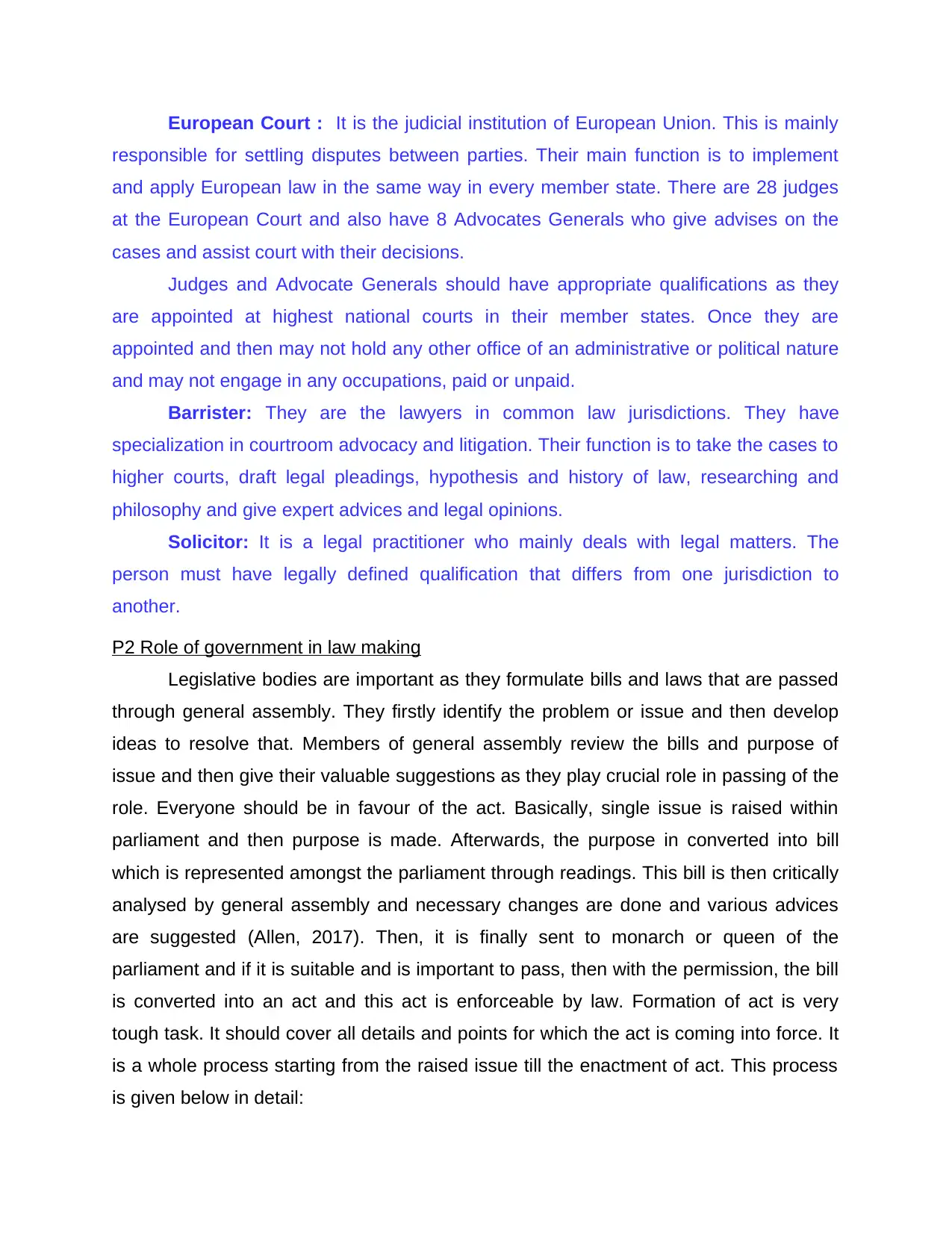
European Court : It is the judicial institution of European Union. This is mainly
responsible for settling disputes between parties. Their main function is to implement
and apply European law in the same way in every member state. There are 28 judges
at the European Court and also have 8 Advocates Generals who give advises on the
cases and assist court with their decisions.
Judges and Advocate Generals should have appropriate qualifications as they
are appointed at highest national courts in their member states. Once they are
appointed and then may not hold any other office of an administrative or political nature
and may not engage in any occupations, paid or unpaid.
Barrister: They are the lawyers in common law jurisdictions. They have
specialization in courtroom advocacy and litigation. Their function is to take the cases to
higher courts, draft legal pleadings, hypothesis and history of law, researching and
philosophy and give expert advices and legal opinions.
Solicitor: It is a legal practitioner who mainly deals with legal matters. The
person must have legally defined qualification that differs from one jurisdiction to
another.
P2 Role of government in law making
Legislative bodies are important as they formulate bills and laws that are passed
through general assembly. They firstly identify the problem or issue and then develop
ideas to resolve that. Members of general assembly review the bills and purpose of
issue and then give their valuable suggestions as they play crucial role in passing of the
role. Everyone should be in favour of the act. Basically, single issue is raised within
parliament and then purpose is made. Afterwards, the purpose in converted into bill
which is represented amongst the parliament through readings. This bill is then critically
analysed by general assembly and necessary changes are done and various advices
are suggested (Allen, 2017). Then, it is finally sent to monarch or queen of the
parliament and if it is suitable and is important to pass, then with the permission, the bill
is converted into an act and this act is enforceable by law. Formation of act is very
tough task. It should cover all details and points for which the act is coming into force. It
is a whole process starting from the raised issue till the enactment of act. This process
is given below in detail:
responsible for settling disputes between parties. Their main function is to implement
and apply European law in the same way in every member state. There are 28 judges
at the European Court and also have 8 Advocates Generals who give advises on the
cases and assist court with their decisions.
Judges and Advocate Generals should have appropriate qualifications as they
are appointed at highest national courts in their member states. Once they are
appointed and then may not hold any other office of an administrative or political nature
and may not engage in any occupations, paid or unpaid.
Barrister: They are the lawyers in common law jurisdictions. They have
specialization in courtroom advocacy and litigation. Their function is to take the cases to
higher courts, draft legal pleadings, hypothesis and history of law, researching and
philosophy and give expert advices and legal opinions.
Solicitor: It is a legal practitioner who mainly deals with legal matters. The
person must have legally defined qualification that differs from one jurisdiction to
another.
P2 Role of government in law making
Legislative bodies are important as they formulate bills and laws that are passed
through general assembly. They firstly identify the problem or issue and then develop
ideas to resolve that. Members of general assembly review the bills and purpose of
issue and then give their valuable suggestions as they play crucial role in passing of the
role. Everyone should be in favour of the act. Basically, single issue is raised within
parliament and then purpose is made. Afterwards, the purpose in converted into bill
which is represented amongst the parliament through readings. This bill is then critically
analysed by general assembly and necessary changes are done and various advices
are suggested (Allen, 2017). Then, it is finally sent to monarch or queen of the
parliament and if it is suitable and is important to pass, then with the permission, the bill
is converted into an act and this act is enforceable by law. Formation of act is very
tough task. It should cover all details and points for which the act is coming into force. It
is a whole process starting from the raised issue till the enactment of act. This process
is given below in detail:
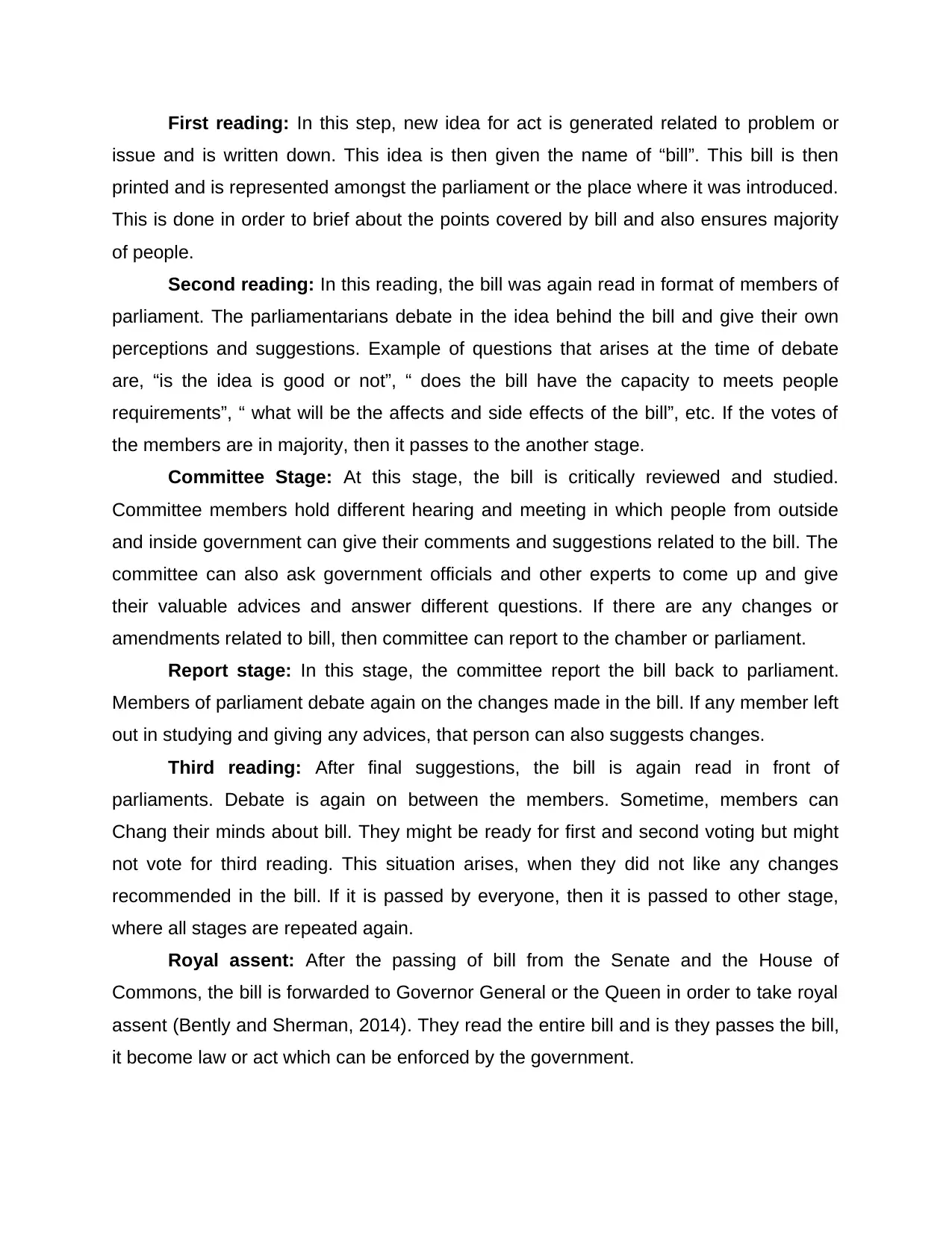
First reading: In this step, new idea for act is generated related to problem or
issue and is written down. This idea is then given the name of “bill”. This bill is then
printed and is represented amongst the parliament or the place where it was introduced.
This is done in order to brief about the points covered by bill and also ensures majority
of people.
Second reading: In this reading, the bill was again read in format of members of
parliament. The parliamentarians debate in the idea behind the bill and give their own
perceptions and suggestions. Example of questions that arises at the time of debate
are, “is the idea is good or not”, “ does the bill have the capacity to meets people
requirements”, “ what will be the affects and side effects of the bill”, etc. If the votes of
the members are in majority, then it passes to the another stage.
Committee Stage: At this stage, the bill is critically reviewed and studied.
Committee members hold different hearing and meeting in which people from outside
and inside government can give their comments and suggestions related to the bill. The
committee can also ask government officials and other experts to come up and give
their valuable advices and answer different questions. If there are any changes or
amendments related to bill, then committee can report to the chamber or parliament.
Report stage: In this stage, the committee report the bill back to parliament.
Members of parliament debate again on the changes made in the bill. If any member left
out in studying and giving any advices, that person can also suggests changes.
Third reading: After final suggestions, the bill is again read in front of
parliaments. Debate is again on between the members. Sometime, members can
Chang their minds about bill. They might be ready for first and second voting but might
not vote for third reading. This situation arises, when they did not like any changes
recommended in the bill. If it is passed by everyone, then it is passed to other stage,
where all stages are repeated again.
Royal assent: After the passing of bill from the Senate and the House of
Commons, the bill is forwarded to Governor General or the Queen in order to take royal
assent (Bently and Sherman, 2014). They read the entire bill and is they passes the bill,
it become law or act which can be enforced by the government.
issue and is written down. This idea is then given the name of “bill”. This bill is then
printed and is represented amongst the parliament or the place where it was introduced.
This is done in order to brief about the points covered by bill and also ensures majority
of people.
Second reading: In this reading, the bill was again read in format of members of
parliament. The parliamentarians debate in the idea behind the bill and give their own
perceptions and suggestions. Example of questions that arises at the time of debate
are, “is the idea is good or not”, “ does the bill have the capacity to meets people
requirements”, “ what will be the affects and side effects of the bill”, etc. If the votes of
the members are in majority, then it passes to the another stage.
Committee Stage: At this stage, the bill is critically reviewed and studied.
Committee members hold different hearing and meeting in which people from outside
and inside government can give their comments and suggestions related to the bill. The
committee can also ask government officials and other experts to come up and give
their valuable advices and answer different questions. If there are any changes or
amendments related to bill, then committee can report to the chamber or parliament.
Report stage: In this stage, the committee report the bill back to parliament.
Members of parliament debate again on the changes made in the bill. If any member left
out in studying and giving any advices, that person can also suggests changes.
Third reading: After final suggestions, the bill is again read in front of
parliaments. Debate is again on between the members. Sometime, members can
Chang their minds about bill. They might be ready for first and second voting but might
not vote for third reading. This situation arises, when they did not like any changes
recommended in the bill. If it is passed by everyone, then it is passed to other stage,
where all stages are repeated again.
Royal assent: After the passing of bill from the Senate and the House of
Commons, the bill is forwarded to Governor General or the Queen in order to take royal
assent (Bently and Sherman, 2014). They read the entire bill and is they passes the bill,
it become law or act which can be enforced by the government.
⊘ This is a preview!⊘
Do you want full access?
Subscribe today to unlock all pages.

Trusted by 1+ million students worldwide
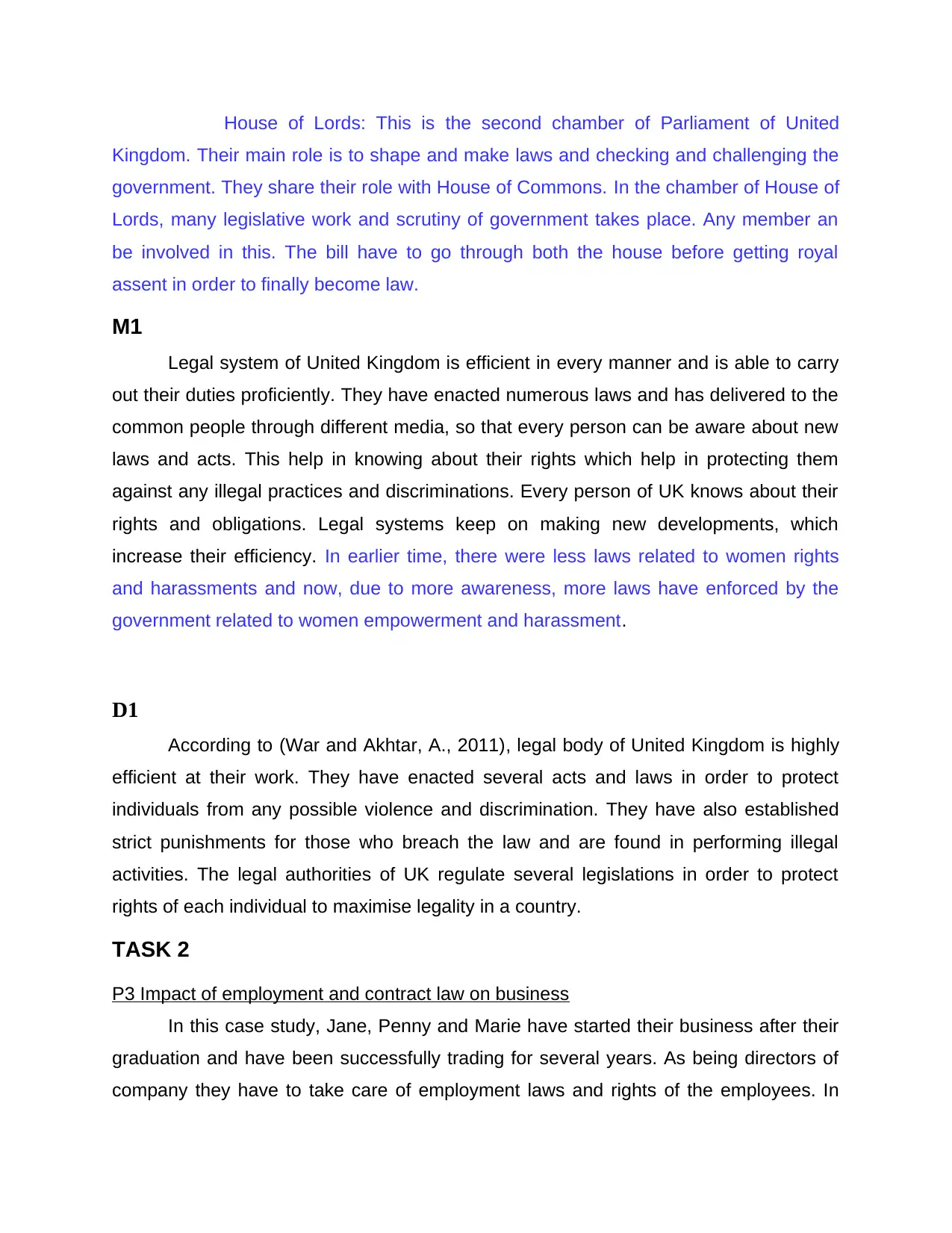
House of Lords: This is the second chamber of Parliament of United
Kingdom. Their main role is to shape and make laws and checking and challenging the
government. They share their role with House of Commons. In the chamber of House of
Lords, many legislative work and scrutiny of government takes place. Any member an
be involved in this. The bill have to go through both the house before getting royal
assent in order to finally become law.
M1
Legal system of United Kingdom is efficient in every manner and is able to carry
out their duties proficiently. They have enacted numerous laws and has delivered to the
common people through different media, so that every person can be aware about new
laws and acts. This help in knowing about their rights which help in protecting them
against any illegal practices and discriminations. Every person of UK knows about their
rights and obligations. Legal systems keep on making new developments, which
increase their efficiency. In earlier time, there were less laws related to women rights
and harassments and now, due to more awareness, more laws have enforced by the
government related to women empowerment and harassment.
D1
According to (War and Akhtar, A., 2011), legal body of United Kingdom is highly
efficient at their work. They have enacted several acts and laws in order to protect
individuals from any possible violence and discrimination. They have also established
strict punishments for those who breach the law and are found in performing illegal
activities. The legal authorities of UK regulate several legislations in order to protect
rights of each individual to maximise legality in a country.
TASK 2
P3 Impact of employment and contract law on business
In this case study, Jane, Penny and Marie have started their business after their
graduation and have been successfully trading for several years. As being directors of
company they have to take care of employment laws and rights of the employees. In
Kingdom. Their main role is to shape and make laws and checking and challenging the
government. They share their role with House of Commons. In the chamber of House of
Lords, many legislative work and scrutiny of government takes place. Any member an
be involved in this. The bill have to go through both the house before getting royal
assent in order to finally become law.
M1
Legal system of United Kingdom is efficient in every manner and is able to carry
out their duties proficiently. They have enacted numerous laws and has delivered to the
common people through different media, so that every person can be aware about new
laws and acts. This help in knowing about their rights which help in protecting them
against any illegal practices and discriminations. Every person of UK knows about their
rights and obligations. Legal systems keep on making new developments, which
increase their efficiency. In earlier time, there were less laws related to women rights
and harassments and now, due to more awareness, more laws have enforced by the
government related to women empowerment and harassment.
D1
According to (War and Akhtar, A., 2011), legal body of United Kingdom is highly
efficient at their work. They have enacted several acts and laws in order to protect
individuals from any possible violence and discrimination. They have also established
strict punishments for those who breach the law and are found in performing illegal
activities. The legal authorities of UK regulate several legislations in order to protect
rights of each individual to maximise legality in a country.
TASK 2
P3 Impact of employment and contract law on business
In this case study, Jane, Penny and Marie have started their business after their
graduation and have been successfully trading for several years. As being directors of
company they have to take care of employment laws and rights of the employees. In
Paraphrase This Document
Need a fresh take? Get an instant paraphrase of this document with our AI Paraphraser
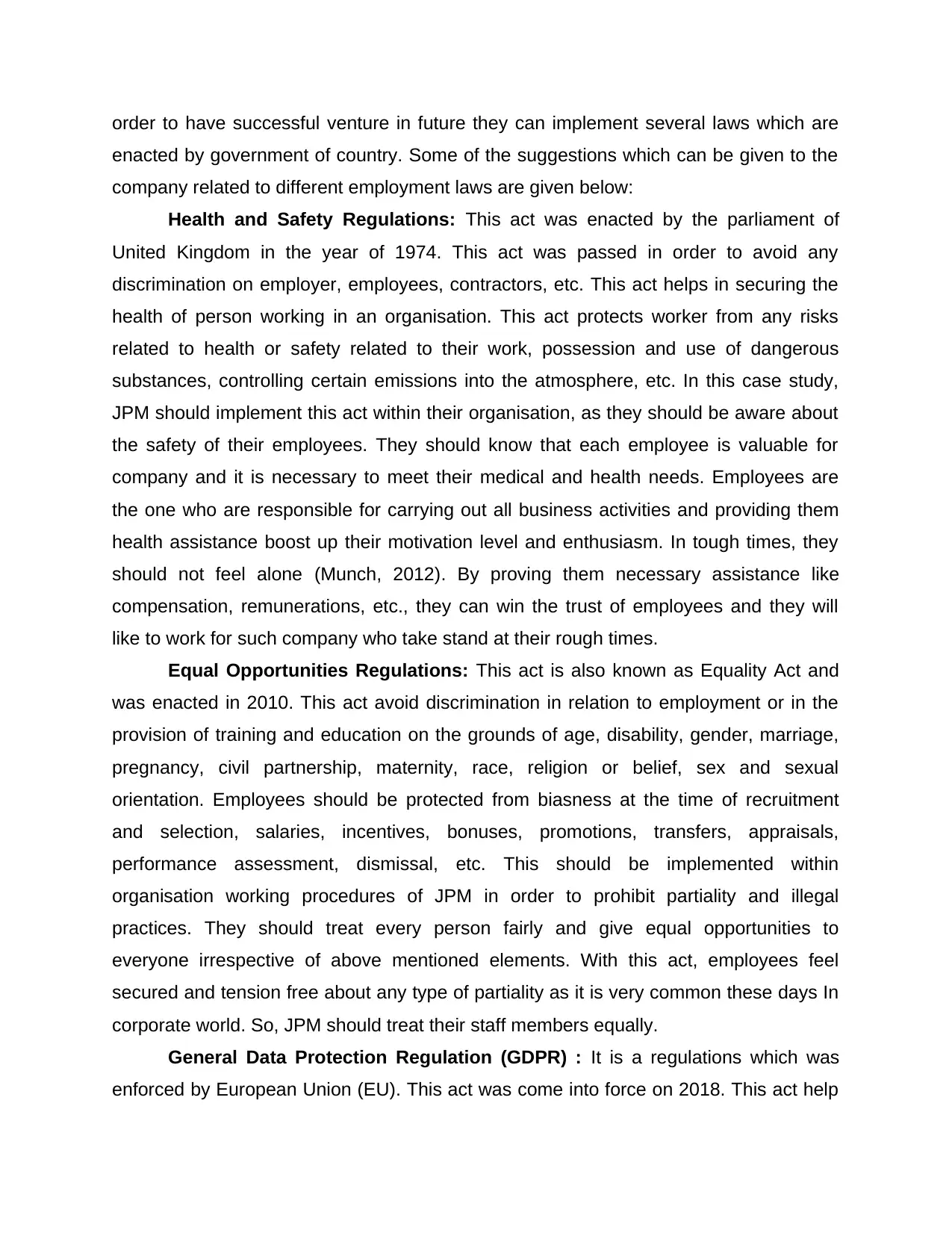
order to have successful venture in future they can implement several laws which are
enacted by government of country. Some of the suggestions which can be given to the
company related to different employment laws are given below:
Health and Safety Regulations: This act was enacted by the parliament of
United Kingdom in the year of 1974. This act was passed in order to avoid any
discrimination on employer, employees, contractors, etc. This act helps in securing the
health of person working in an organisation. This act protects worker from any risks
related to health or safety related to their work, possession and use of dangerous
substances, controlling certain emissions into the atmosphere, etc. In this case study,
JPM should implement this act within their organisation, as they should be aware about
the safety of their employees. They should know that each employee is valuable for
company and it is necessary to meet their medical and health needs. Employees are
the one who are responsible for carrying out all business activities and providing them
health assistance boost up their motivation level and enthusiasm. In tough times, they
should not feel alone (Munch, 2012). By proving them necessary assistance like
compensation, remunerations, etc., they can win the trust of employees and they will
like to work for such company who take stand at their rough times.
Equal Opportunities Regulations: This act is also known as Equality Act and
was enacted in 2010. This act avoid discrimination in relation to employment or in the
provision of training and education on the grounds of age, disability, gender, marriage,
pregnancy, civil partnership, maternity, race, religion or belief, sex and sexual
orientation. Employees should be protected from biasness at the time of recruitment
and selection, salaries, incentives, bonuses, promotions, transfers, appraisals,
performance assessment, dismissal, etc. This should be implemented within
organisation working procedures of JPM in order to prohibit partiality and illegal
practices. They should treat every person fairly and give equal opportunities to
everyone irrespective of above mentioned elements. With this act, employees feel
secured and tension free about any type of partiality as it is very common these days In
corporate world. So, JPM should treat their staff members equally.
General Data Protection Regulation (GDPR) : It is a regulations which was
enforced by European Union (EU). This act was come into force on 2018. This act help
enacted by government of country. Some of the suggestions which can be given to the
company related to different employment laws are given below:
Health and Safety Regulations: This act was enacted by the parliament of
United Kingdom in the year of 1974. This act was passed in order to avoid any
discrimination on employer, employees, contractors, etc. This act helps in securing the
health of person working in an organisation. This act protects worker from any risks
related to health or safety related to their work, possession and use of dangerous
substances, controlling certain emissions into the atmosphere, etc. In this case study,
JPM should implement this act within their organisation, as they should be aware about
the safety of their employees. They should know that each employee is valuable for
company and it is necessary to meet their medical and health needs. Employees are
the one who are responsible for carrying out all business activities and providing them
health assistance boost up their motivation level and enthusiasm. In tough times, they
should not feel alone (Munch, 2012). By proving them necessary assistance like
compensation, remunerations, etc., they can win the trust of employees and they will
like to work for such company who take stand at their rough times.
Equal Opportunities Regulations: This act is also known as Equality Act and
was enacted in 2010. This act avoid discrimination in relation to employment or in the
provision of training and education on the grounds of age, disability, gender, marriage,
pregnancy, civil partnership, maternity, race, religion or belief, sex and sexual
orientation. Employees should be protected from biasness at the time of recruitment
and selection, salaries, incentives, bonuses, promotions, transfers, appraisals,
performance assessment, dismissal, etc. This should be implemented within
organisation working procedures of JPM in order to prohibit partiality and illegal
practices. They should treat every person fairly and give equal opportunities to
everyone irrespective of above mentioned elements. With this act, employees feel
secured and tension free about any type of partiality as it is very common these days In
corporate world. So, JPM should treat their staff members equally.
General Data Protection Regulation (GDPR) : It is a regulations which was
enforced by European Union (EU). This act was come into force on 2018. This act help
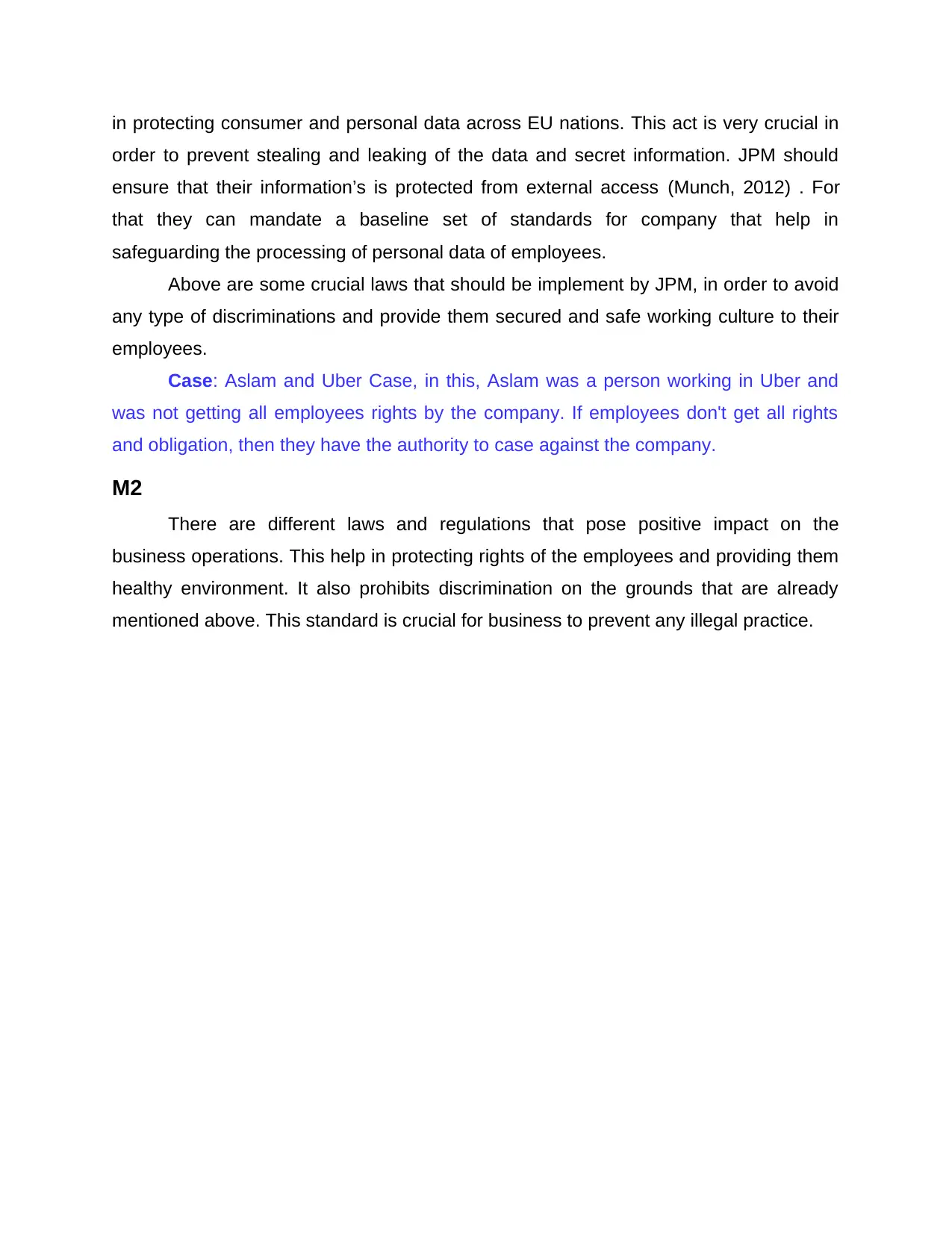
in protecting consumer and personal data across EU nations. This act is very crucial in
order to prevent stealing and leaking of the data and secret information. JPM should
ensure that their information’s is protected from external access (Munch, 2012) . For
that they can mandate a baseline set of standards for company that help in
safeguarding the processing of personal data of employees.
Above are some crucial laws that should be implement by JPM, in order to avoid
any type of discriminations and provide them secured and safe working culture to their
employees.
Case: Aslam and Uber Case, in this, Aslam was a person working in Uber and
was not getting all employees rights by the company. If employees don't get all rights
and obligation, then they have the authority to case against the company.
M2
There are different laws and regulations that pose positive impact on the
business operations. This help in protecting rights of the employees and providing them
healthy environment. It also prohibits discrimination on the grounds that are already
mentioned above. This standard is crucial for business to prevent any illegal practice.
order to prevent stealing and leaking of the data and secret information. JPM should
ensure that their information’s is protected from external access (Munch, 2012) . For
that they can mandate a baseline set of standards for company that help in
safeguarding the processing of personal data of employees.
Above are some crucial laws that should be implement by JPM, in order to avoid
any type of discriminations and provide them secured and safe working culture to their
employees.
Case: Aslam and Uber Case, in this, Aslam was a person working in Uber and
was not getting all employees rights by the company. If employees don't get all rights
and obligation, then they have the authority to case against the company.
M2
There are different laws and regulations that pose positive impact on the
business operations. This help in protecting rights of the employees and providing them
healthy environment. It also prohibits discrimination on the grounds that are already
mentioned above. This standard is crucial for business to prevent any illegal practice.
⊘ This is a preview!⊘
Do you want full access?
Subscribe today to unlock all pages.

Trusted by 1+ million students worldwide
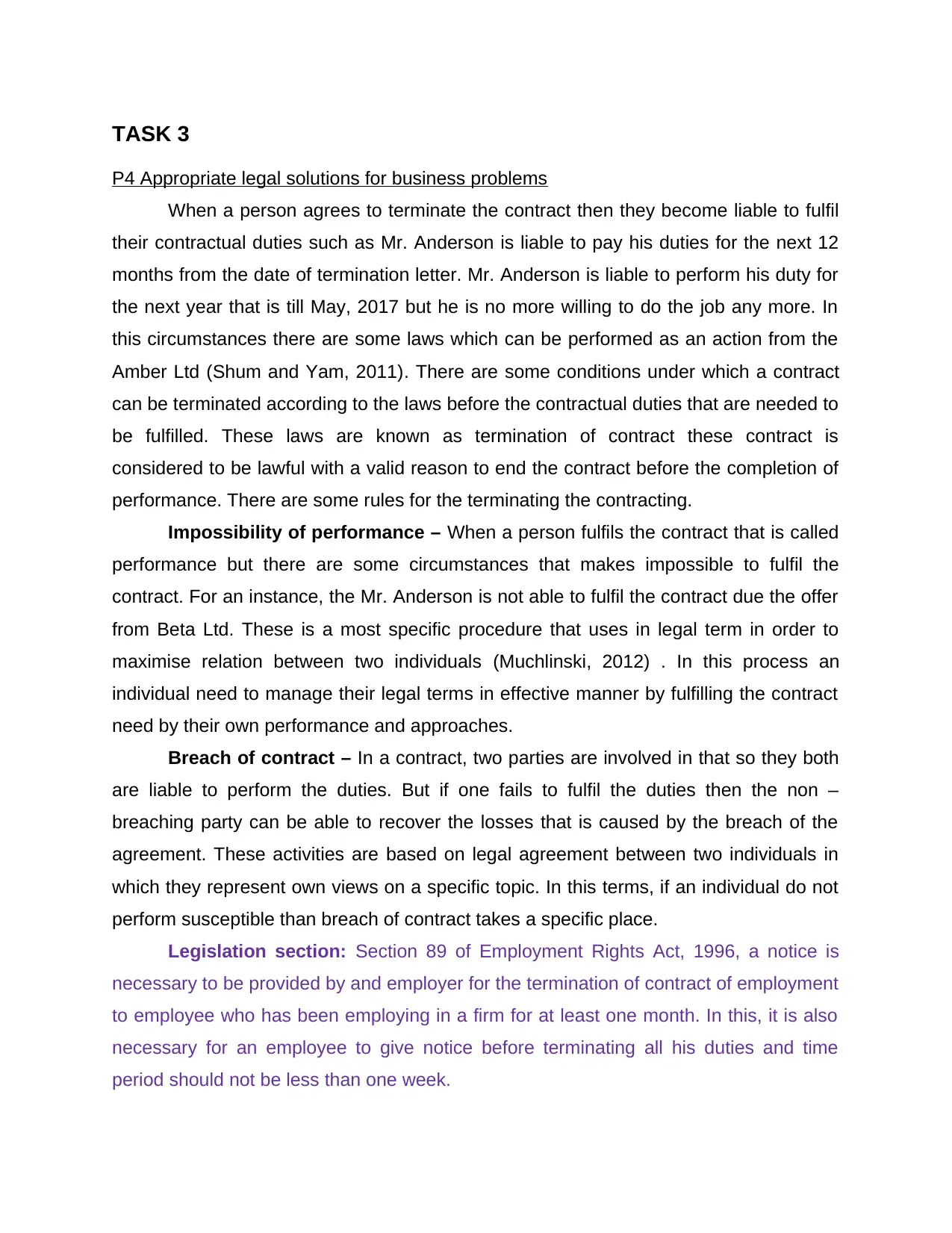
TASK 3
P4 Appropriate legal solutions for business problems
When a person agrees to terminate the contract then they become liable to fulfil
their contractual duties such as Mr. Anderson is liable to pay his duties for the next 12
months from the date of termination letter. Mr. Anderson is liable to perform his duty for
the next year that is till May, 2017 but he is no more willing to do the job any more. In
this circumstances there are some laws which can be performed as an action from the
Amber Ltd (Shum and Yam, 2011). There are some conditions under which a contract
can be terminated according to the laws before the contractual duties that are needed to
be fulfilled. These laws are known as termination of contract these contract is
considered to be lawful with a valid reason to end the contract before the completion of
performance. There are some rules for the terminating the contracting.
Impossibility of performance – When a person fulfils the contract that is called
performance but there are some circumstances that makes impossible to fulfil the
contract. For an instance, the Mr. Anderson is not able to fulfil the contract due the offer
from Beta Ltd. These is a most specific procedure that uses in legal term in order to
maximise relation between two individuals (Muchlinski, 2012) . In this process an
individual need to manage their legal terms in effective manner by fulfilling the contract
need by their own performance and approaches.
Breach of contract – In a contract, two parties are involved in that so they both
are liable to perform the duties. But if one fails to fulfil the duties then the non –
breaching party can be able to recover the losses that is caused by the breach of the
agreement. These activities are based on legal agreement between two individuals in
which they represent own views on a specific topic. In this terms, if an individual do not
perform susceptible than breach of contract takes a specific place.
Legislation section: Section 89 of Employment Rights Act, 1996, a notice is
necessary to be provided by and employer for the termination of contract of employment
to employee who has been employing in a firm for at least one month. In this, it is also
necessary for an employee to give notice before terminating all his duties and time
period should not be less than one week.
P4 Appropriate legal solutions for business problems
When a person agrees to terminate the contract then they become liable to fulfil
their contractual duties such as Mr. Anderson is liable to pay his duties for the next 12
months from the date of termination letter. Mr. Anderson is liable to perform his duty for
the next year that is till May, 2017 but he is no more willing to do the job any more. In
this circumstances there are some laws which can be performed as an action from the
Amber Ltd (Shum and Yam, 2011). There are some conditions under which a contract
can be terminated according to the laws before the contractual duties that are needed to
be fulfilled. These laws are known as termination of contract these contract is
considered to be lawful with a valid reason to end the contract before the completion of
performance. There are some rules for the terminating the contracting.
Impossibility of performance – When a person fulfils the contract that is called
performance but there are some circumstances that makes impossible to fulfil the
contract. For an instance, the Mr. Anderson is not able to fulfil the contract due the offer
from Beta Ltd. These is a most specific procedure that uses in legal term in order to
maximise relation between two individuals (Muchlinski, 2012) . In this process an
individual need to manage their legal terms in effective manner by fulfilling the contract
need by their own performance and approaches.
Breach of contract – In a contract, two parties are involved in that so they both
are liable to perform the duties. But if one fails to fulfil the duties then the non –
breaching party can be able to recover the losses that is caused by the breach of the
agreement. These activities are based on legal agreement between two individuals in
which they represent own views on a specific topic. In this terms, if an individual do not
perform susceptible than breach of contract takes a specific place.
Legislation section: Section 89 of Employment Rights Act, 1996, a notice is
necessary to be provided by and employer for the termination of contract of employment
to employee who has been employing in a firm for at least one month. In this, it is also
necessary for an employee to give notice before terminating all his duties and time
period should not be less than one week.
Paraphrase This Document
Need a fresh take? Get an instant paraphrase of this document with our AI Paraphraser
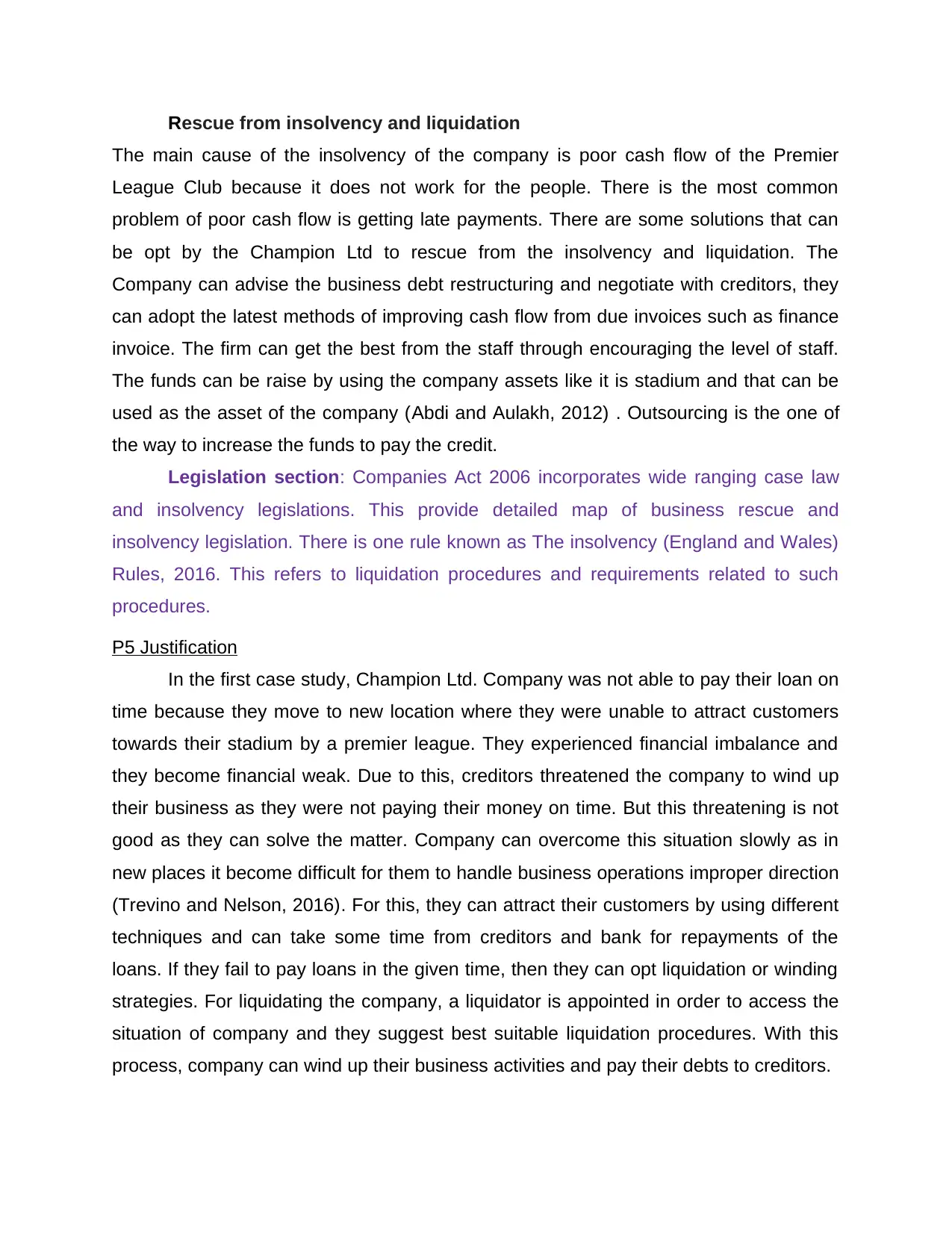
Rescue from insolvency and liquidation
The main cause of the insolvency of the company is poor cash flow of the Premier
League Club because it does not work for the people. There is the most common
problem of poor cash flow is getting late payments. There are some solutions that can
be opt by the Champion Ltd to rescue from the insolvency and liquidation. The
Company can advise the business debt restructuring and negotiate with creditors, they
can adopt the latest methods of improving cash flow from due invoices such as finance
invoice. The firm can get the best from the staff through encouraging the level of staff.
The funds can be raise by using the company assets like it is stadium and that can be
used as the asset of the company (Abdi and Aulakh, 2012) . Outsourcing is the one of
the way to increase the funds to pay the credit.
Legislation section: Companies Act 2006 incorporates wide ranging case law
and insolvency legislations. This provide detailed map of business rescue and
insolvency legislation. There is one rule known as The insolvency (England and Wales)
Rules, 2016. This refers to liquidation procedures and requirements related to such
procedures.
P5 Justification
In the first case study, Champion Ltd. Company was not able to pay their loan on
time because they move to new location where they were unable to attract customers
towards their stadium by a premier league. They experienced financial imbalance and
they become financial weak. Due to this, creditors threatened the company to wind up
their business as they were not paying their money on time. But this threatening is not
good as they can solve the matter. Company can overcome this situation slowly as in
new places it become difficult for them to handle business operations improper direction
(Trevino and Nelson, 2016). For this, they can attract their customers by using different
techniques and can take some time from creditors and bank for repayments of the
loans. If they fail to pay loans in the given time, then they can opt liquidation or winding
strategies. For liquidating the company, a liquidator is appointed in order to access the
situation of company and they suggest best suitable liquidation procedures. With this
process, company can wind up their business activities and pay their debts to creditors.
The main cause of the insolvency of the company is poor cash flow of the Premier
League Club because it does not work for the people. There is the most common
problem of poor cash flow is getting late payments. There are some solutions that can
be opt by the Champion Ltd to rescue from the insolvency and liquidation. The
Company can advise the business debt restructuring and negotiate with creditors, they
can adopt the latest methods of improving cash flow from due invoices such as finance
invoice. The firm can get the best from the staff through encouraging the level of staff.
The funds can be raise by using the company assets like it is stadium and that can be
used as the asset of the company (Abdi and Aulakh, 2012) . Outsourcing is the one of
the way to increase the funds to pay the credit.
Legislation section: Companies Act 2006 incorporates wide ranging case law
and insolvency legislations. This provide detailed map of business rescue and
insolvency legislation. There is one rule known as The insolvency (England and Wales)
Rules, 2016. This refers to liquidation procedures and requirements related to such
procedures.
P5 Justification
In the first case study, Champion Ltd. Company was not able to pay their loan on
time because they move to new location where they were unable to attract customers
towards their stadium by a premier league. They experienced financial imbalance and
they become financial weak. Due to this, creditors threatened the company to wind up
their business as they were not paying their money on time. But this threatening is not
good as they can solve the matter. Company can overcome this situation slowly as in
new places it become difficult for them to handle business operations improper direction
(Trevino and Nelson, 2016). For this, they can attract their customers by using different
techniques and can take some time from creditors and bank for repayments of the
loans. If they fail to pay loans in the given time, then they can opt liquidation or winding
strategies. For liquidating the company, a liquidator is appointed in order to access the
situation of company and they suggest best suitable liquidation procedures. With this
process, company can wind up their business activities and pay their debts to creditors.
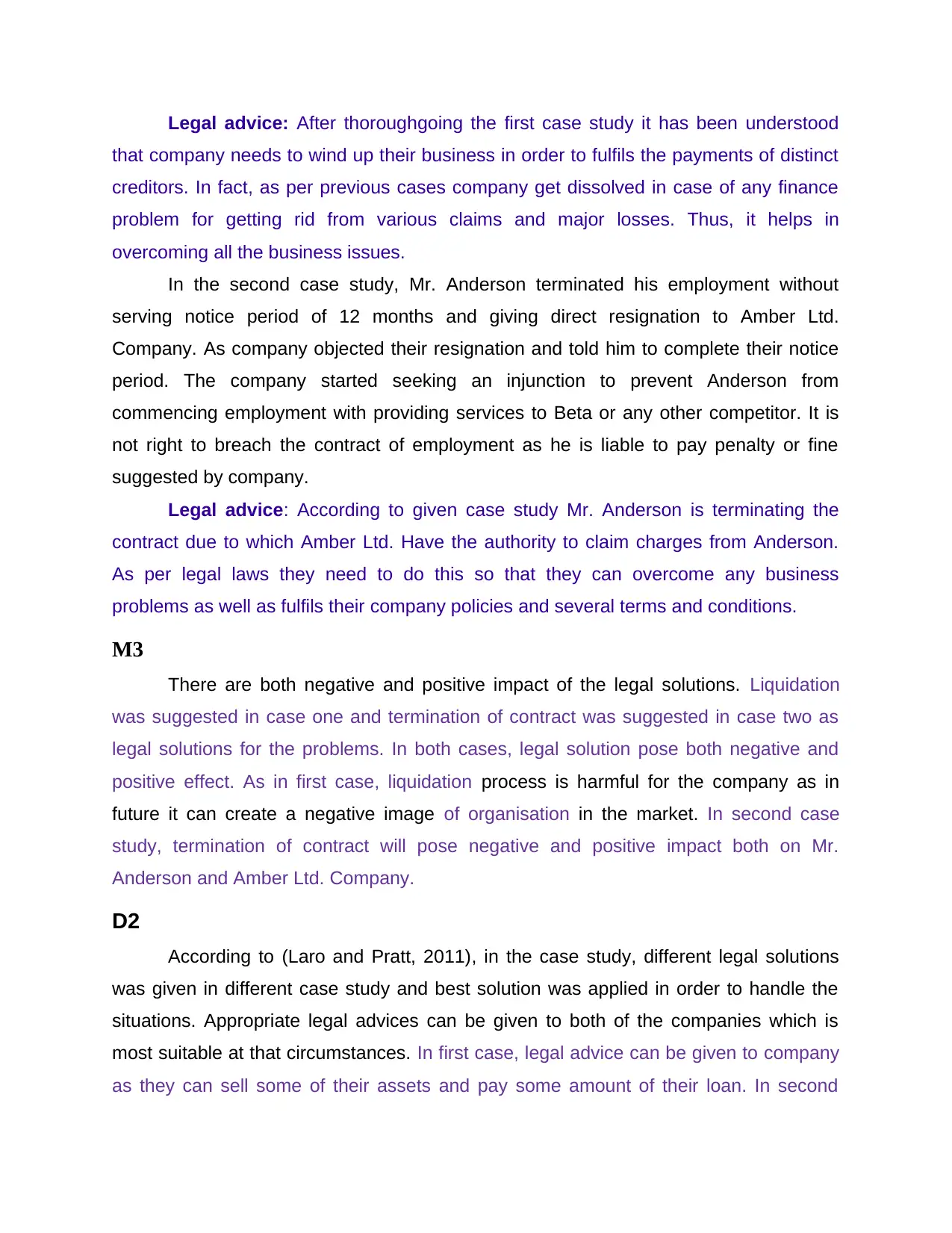
Legal advice: After thoroughgoing the first case study it has been understood
that company needs to wind up their business in order to fulfils the payments of distinct
creditors. In fact, as per previous cases company get dissolved in case of any finance
problem for getting rid from various claims and major losses. Thus, it helps in
overcoming all the business issues.
In the second case study, Mr. Anderson terminated his employment without
serving notice period of 12 months and giving direct resignation to Amber Ltd.
Company. As company objected their resignation and told him to complete their notice
period. The company started seeking an injunction to prevent Anderson from
commencing employment with providing services to Beta or any other competitor. It is
not right to breach the contract of employment as he is liable to pay penalty or fine
suggested by company.
Legal advice: According to given case study Mr. Anderson is terminating the
contract due to which Amber Ltd. Have the authority to claim charges from Anderson.
As per legal laws they need to do this so that they can overcome any business
problems as well as fulfils their company policies and several terms and conditions.
M3
There are both negative and positive impact of the legal solutions. Liquidation
was suggested in case one and termination of contract was suggested in case two as
legal solutions for the problems. In both cases, legal solution pose both negative and
positive effect. As in first case, liquidation process is harmful for the company as in
future it can create a negative image of organisation in the market. In second case
study, termination of contract will pose negative and positive impact both on Mr.
Anderson and Amber Ltd. Company.
D2
According to (Laro and Pratt, 2011), in the case study, different legal solutions
was given in different case study and best solution was applied in order to handle the
situations. Appropriate legal advices can be given to both of the companies which is
most suitable at that circumstances. In first case, legal advice can be given to company
as they can sell some of their assets and pay some amount of their loan. In second
that company needs to wind up their business in order to fulfils the payments of distinct
creditors. In fact, as per previous cases company get dissolved in case of any finance
problem for getting rid from various claims and major losses. Thus, it helps in
overcoming all the business issues.
In the second case study, Mr. Anderson terminated his employment without
serving notice period of 12 months and giving direct resignation to Amber Ltd.
Company. As company objected their resignation and told him to complete their notice
period. The company started seeking an injunction to prevent Anderson from
commencing employment with providing services to Beta or any other competitor. It is
not right to breach the contract of employment as he is liable to pay penalty or fine
suggested by company.
Legal advice: According to given case study Mr. Anderson is terminating the
contract due to which Amber Ltd. Have the authority to claim charges from Anderson.
As per legal laws they need to do this so that they can overcome any business
problems as well as fulfils their company policies and several terms and conditions.
M3
There are both negative and positive impact of the legal solutions. Liquidation
was suggested in case one and termination of contract was suggested in case two as
legal solutions for the problems. In both cases, legal solution pose both negative and
positive effect. As in first case, liquidation process is harmful for the company as in
future it can create a negative image of organisation in the market. In second case
study, termination of contract will pose negative and positive impact both on Mr.
Anderson and Amber Ltd. Company.
D2
According to (Laro and Pratt, 2011), in the case study, different legal solutions
was given in different case study and best solution was applied in order to handle the
situations. Appropriate legal advices can be given to both of the companies which is
most suitable at that circumstances. In first case, legal advice can be given to company
as they can sell some of their assets and pay some amount of their loan. In second
⊘ This is a preview!⊘
Do you want full access?
Subscribe today to unlock all pages.

Trusted by 1+ million students worldwide
1 out of 18
Related Documents
Your All-in-One AI-Powered Toolkit for Academic Success.
+13062052269
info@desklib.com
Available 24*7 on WhatsApp / Email
![[object Object]](/_next/static/media/star-bottom.7253800d.svg)
Unlock your academic potential
Copyright © 2020–2026 A2Z Services. All Rights Reserved. Developed and managed by ZUCOL.





